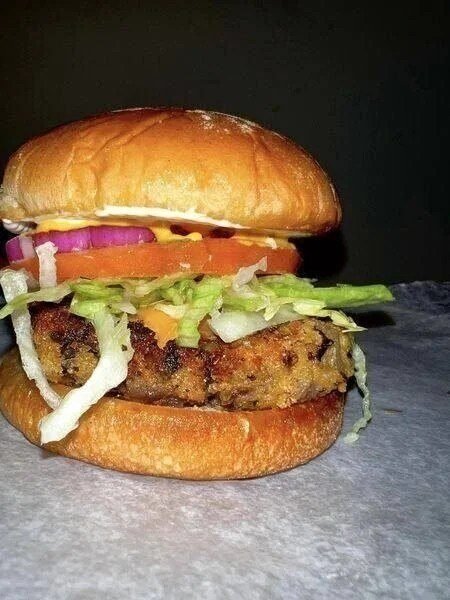“Indulge in a nutritious and flavorful vegan burger with this chickpea and mushroom creation. Combining mashed chickpeas, savory mushrooms, spices, and breadcrumbs, these patties offer a delightful texture and taste. Sautéed with aromatic onions and garlic, these burgers are versatile and easy to customize. Cook them to golden perfection, then serve on buns with your favorite toppings for a satisfying plant-based meal that’s rich in protein, fiber, and flavor.”
Ingredients:
- 1 can (15 oz) chickpeas, drained and rinsed
- 2 cups mushrooms, finely chopped
- 1 small onion, finely chopped
- 2 cloves garlic, minced
- 1 tablespoon olive oil
- 1 teaspoon cumin
- 1 teaspoon smoked paprika
- 1/2 teaspoon chili powder (adjust to taste)
- Salt and pepper to taste
- 1/2 cup breadcrumbs
- 1 tablespoon soy sauce or tamari
- 1 tablespoon nutritional yeast (optional, for added flavor)
- Burger buns
- Your choice of toppings (lettuce, tomato, avocado, etc.)
Instructions:
- Prepare the chickpeas and mushrooms:
- In a pan, heat olive oil over medium heat. Add chopped onions and garlic, sautéing until softened.
- Add the chopped mushrooms and cook until they release their moisture and start to brown. Remove from heat and let it cool slightly.
- Make the burger mixture:
- In a food processor, pulse the chickpeas until they are mashed but still slightly chunky.
- In a mixing bowl, combine the mashed chickpeas with the cooked mushroom mixture. Add cumin, smoked paprika, chili powder, salt, pepper, breadcrumbs, soy sauce (or tamari), and nutritional yeast if using. Mix until well combined.
- Form the burger patties:
- Divide the mixture into equal portions and shape them into burger patties. If the mixture is too wet, add more breadcrumbs to help bind.
- Cook the patties:
- Heat a skillet or grill over medium heat and lightly oil the surface.
- Cook the burger patties for about 4-5 minutes on each side, or until they are golden brown and heated through.
- Assemble the burgers:
- Toast the burger buns if desired. Place the cooked patties on the buns and add your favorite toppings such as lettuce, tomato, avocado, vegan mayo, or any condiments of your choice.
- Serve:
- Serve these delicious vegan chickpea and mushroom burgers while they’re warm and enjoy!
Nutritional Information (per serving, without buns or toppings):
- Calories: Around 200-250 calories per patty (approximately)
- Protein: Approximately 10-12 grams
- Carbohydrates: Around 25-30 grams
- Fat: Approximately 6-8 grams
- Fiber: Roughly 6-8 grams
- Sodium: Varies based on added salt and soy sauce/tamari
Gut Health:
Plant-based diets are often associated with improved gut health due to the high fiber content from fruits, vegetables, and whole grains. A healthy gut microbiome is linked to better digestion and overall well-being.
Anti-Inflammatory Properties:
Many plant-based foods have anti-inflammatory properties, which can help in reducing inflammation in the body. Chronic inflammation is associated with various health issues, and a vegan diet may contribute to its prevention.
Sports Performance:
Contrary to the misconception that vegan diets lack protein, many successful athletes follow plant-based diets to enhance their performance. Plant-based proteins can support muscle building and recovery.
Reduced Risk of Foodborne Illnesses:
Plant-based diets eliminate the risk of foodborne illnesses associated with the consumption of undercooked or contaminated animal products.
Economic Impact:
A vegan diet can be more economical as plant-based protein sources tend to be cost-effective compared to some animal products. It may be a budget-friendly option for individuals or families.
Mindful Eating:
Adopting a vegan lifestyle often promotes mindful eating. Being more conscious of food choices and sources can lead to a healthier relationship with food and a greater appreciation for the environmental impact of dietary decisions.
Preservation of Biodiversity:
The expansion of animal agriculture often leads to habitat destruction and loss of biodiversity. Choosing a vegan diet supports the preservation of ecosystems and the protection of various species.
Culinary Diversity:
Veganism introduces individuals to a diverse range of cuisines and ingredients from around the world. Exploring plant-based cooking can be a culinary adventure, embracing flavors and techniques from different cultures.
Reduced Antibiotic Resistance:
The use of antibiotics in animal farming contributes to the rise of antibiotic-resistant bacteria. Opting for a vegan diet can be a way to reduce the demand for such practices and promote responsible antibiotic use.
Cruelty-Free Beauty and Personal Care:
Veganism extends to beauty and personal care products. Choosing cruelty-free, vegan alternatives ensures that your lifestyle aligns with ethical choices beyond just dietary preferences.
